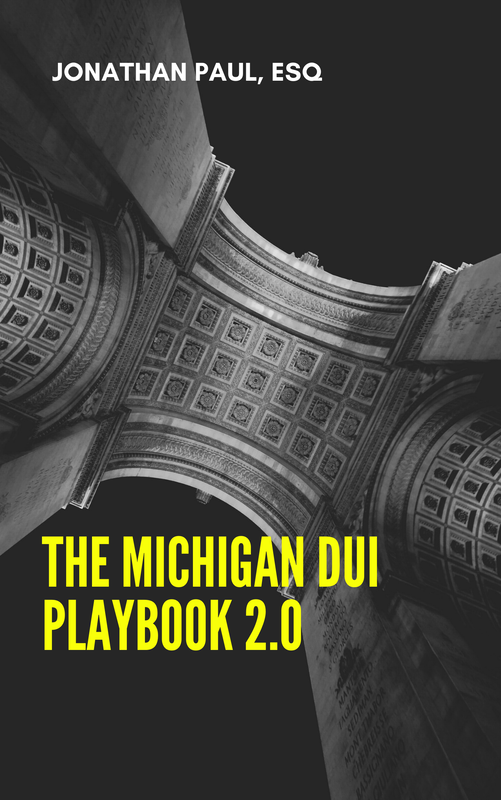|
Any vehicle a defendant is driving when he or she is arrested for drunk driving has the potential of being immobilized on conviction. For a first offense, the immobilization up to 180 days is discretionary with the court. MCL 257.904d(1)(a). For a second offense, immobilization between 90 and 180 days is mandatory. MCL 257.904d(1)(c). Before October 31, 2010, immobilization between one and three years is mandatory for a third or subsequent offense within 10 years, while beginning October 31, 2010, immobilization is mandatory after two or more prior convictions. MCL 257.904d(1)(d). A similar graduated scheme covers the driving with suspended or revoked license offenses of MCL 257.904, .904d(2). If the vehicle is not owned or leased by the defendant, it cannot be immobilized unless there is a showing that the owner or lessee knew that the defendant was going to drive intoxicated or that he or she did not have a valid license. Note that immobilization periods begin at the end of any imprisonment period imposed. MCL 257.904d(6).
Immobilization is authorized in any manner that locks the ignition, wheels, or steering of a vehicle, and penalties attach for attempts to circumvent the method chosen. A court may order the defendant to pay the cost of immobilizing and storing the vehicle. MCL 257.904e. Other statutory provisions govern certification and use of ignition interlock devices, including penalties for tampering with them or operating without the required device. MCL 257.625k, .625l, .904d(1)(c). A person convicted of OWI, MCL 257.625(1), or driving with any amount of a controlled substance in the body, MCL 257.625(8), may be required as a condition of probation to have an approved ignition interlock device installed in any vehicle the person drives. MCL 257.625(24). When a police officer detains a driver of a vehicle for certain drunk driving offenses, he or she must immediately confiscate the registration plate and destroy it, issue a temporary plate (“valid until the charges against the person are dismissed, the person pleads guilty or nolo contendere to those charges, or the person is found guilty of or is acquitted of those charges”), and notify the Michigan Secretary of State. MCL 257.904c. The enumerated offenses are second or subsequent offense OWI, UBAL, OWPCS, OWVI, or any of those offenses resulting in death or serious impairment, and any of those offenses plus the minor BAC offense committed with a person under 16 in the vehicle. If you've been convicted of drunk driving in Michigan, the court may order vehicle immobilization. Vehicle immobilization could mean locking the ignition, wheels or steering device; any attempt to circumvent these devices bring additional penalties.
The cost of installation of these devices will be paid by the defendant. Having your vehicle immobilized could put a huge burden on your ability to work or your family members to have a normal lifestyle. If a police officer detains a driver for drunk driving, the officer must immediately confiscate the registration plate and destroy it, while issuing a temporary license plate, which is valid until the charges against the person are dismissed, or the person pleads guilty or is convicted at trial. For a first offense, there is a discretionary 180 day immobilization, a second offense the immobilization is between 90 and 180 days, which is mandatory, and for a third offense, there is a mandatory one to three year term of immobilization. Vehicle immobilization only applies to the vehicle involved in the offense; the court cannot order immobilization of other vehicles owned or leased by the defendant. Immobilization is required if the "defendant is the owner, co-owner, lessee, or co-lessee of the vehicle operated during the violation." [Section 904d(4)(a)] If the defendant does not have an ownership interest in the vehicle, immobilization is permitted if the "owner, co-owner, lessee, or co-lessee knowingly allowed" the offender to operate the vehicle when the driver was drunk or drugged, or when the offender's driver license was suspended, revoked, or denied, or when the offender had never applied for a driver license. This provision applies even if the offender is not convicted. [Section 904d(4)(b)] Transfer of the Vehicle, Getting Another Vehicle, and Tampering with an Immobilization Device A violation any of the following provisions is a misdemeanor, which may be punished by imprisonment for no more than 93 days, a fine of not more than $100.00, or both. An offender whose vehicle is immobilized may sell the vehicle during the period of immobilization. However, unless there is an appropriate court order, the vehicle may not be sold to a person who would not have to pay use tax under section 3(3)(a) of the Use Tax Act [MCL 205.93]. [Section 904e(2) of the Code; MCL 257.904e(2)]. This generally means an immediate family member. Speak to an attorney for clarification on this issue. An offender who is prohibited from driving because of vehicle immobilization cannot purchase, lease, or otherwise obtain a vehicle during the immobilization period. [Section 904e(3) of the Code] A person cannot do any of the following if he or she knows, or should know, that a court has ordered that a vehicle be immobilized [Section 904e(4) of the Code]: Remove, tamper with, or bypass the immobilization device. Attempt to remove, tamper with or bypass the immobilization device. Operate or attempt to operate the vehicle. |
Click to Email Me Categories
All
|
Ann Arbor Office LocationPlymouth Office Location |
Representing DUI Clients in MichiganRepresenting clients charged with a DUI in Ann Arbor, Canton, Brighton, Howell, Saline, Adrian, Taylor, Plymouth, Northville, Westland, Ypsilanti, Pittsfield Towsnhip, Warren, Sterling Heights, Farmington, Pontiac, Romulus, Lansing, Novi, South Lyon, Southfield, Birmingham, Bloomfield Hills, Royal Oak, Troy, Rochester, Jackson, East Lansing, Garden City, Livonia, Dearborn, Detroit, St Clair Shores, Hazel Park, Ferndale, Madison Heights, Waterford, Milford, Shelby Township Clarkston, Oak Park, Berkley, Fraser, Sterling Heights, Clinton Township and others throughout Washtenaw, Wayne, Monroe, Jackson, Genesee, Macomb, Ingham, Lenawee, Livingston and Oakland County.
|







